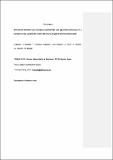Por favor, use este identificador para citar o enlazar a este item:
http://hdl.handle.net/10261/250320COMPARTIR / EXPORTAR:
 SHARE SHARE
 CORE
BASE CORE
BASE
|
|
| Visualizar otros formatos: MARC | Dublin Core | RDF | ORE | MODS | METS | DIDL | DATACITE | |

| Título: | Interactions between soil microbial communities and agronomic behavior in a mandarin crop subjected to water deficit and irrigated with reclaimed water |
Autor: | Abadía Bayona, Javier CSIC ORCID ; Bastida, F. CSIC ORCID; Romero-Trigueros, Cristina; Bayona Gambín, José María CSIC; Vera Ayala, Alfonso; García Izquierdo, Carlos; Alarcón Cabañero, Juan José CSIC ORCID; Nicolás Nicolás, Emilio CSIC ORCID | Palabras clave: | Soil quality Treated wastewater Microbial biomass Regulated deficit irrigation Citrus |
Fecha de publicación: | 31-mar-2021 | Editor: | Elsevier BV | Citación: | Agricultural Water Management 247 (2021) 106749 | Resumen: | The structural deficit of water resources in Mediterranean areas forces us to search for new sources of water for irrigation as a mandatory requirement for a sustainable agriculture. However, given their critical role in soil fertility, the impacts of irrigation in soil microbial communities must be carefully considered alongside the crop responses. Here, we evaluate the impacts of irrigation with water from different origins in the soil microbial community and on the tree physiology and fruit yield in a Mediterranean mandarin agroecosystem. Two sources of water for irrigation were considered: i) fresh water, with an electrical conductivity (EC) of 1.2 dS m, from the Tajo-Segura canal (transfer water, TW); and ii) reclaimed water (EC = 3.4 dS m) from a wastewater treatment plant (RW). Further, the two types of water were applied using two different regimes: control irrigation (C), to fully satisfy the crop water requirements (100% ET), and regulated deficit irrigation (RDI), in which the trees received half the amount of water applied to the C trees (50% ET) during the second stage of fruit development. In the case of TW, RDI increased bacterial biomass, and urease and β-glucosidase activities in soil. In contrast, in the case of RW, RDI did not increase bacterial biomass in comparison to control (RW-C). Irrigation with RW caused a reduction in yield in comparison to TW treatments. The combined evaluation of the plant and soil responses to different irrigation strategies is essential in water-limited Mediterranean areas used to grow citrus crops that require less water and nutrients than other crops. Further, this crop can be favored by the use of low to moderate vigorous rootstocks. Our results demonstrate that RDI does not have a drastic negative impacts on crop yield when RW is used, and that there may be some positive effects in soil microbial communities when TW is used for irrigation. | Versión del editor: | http://dx.doi.org/10.1016/j.agwat.2021.106749 | URI: | http://hdl.handle.net/10261/250320 | DOI: | 10.1016/j.agwat.2021.106749 | Identificadores: | doi: 10.1016/j.agwat.2021.106749 issn: 1873-2283 |
| Aparece en las colecciones: | (CEBAS) Artículos |
Ficheros en este ítem:
| Fichero | Descripción | Tamaño | Formato | |
|---|---|---|---|---|
| Abadia2021AgricWaterMang.pdf | 309,67 kB | Adobe PDF |  Visualizar/Abrir | |
| Abadia2021AgrWatManagSupl.docx | 185,19 kB | Microsoft Word XML | Visualizar/Abrir |
CORE Recommender
SCOPUSTM
Citations
9
checked on 03-may-2024
WEB OF SCIENCETM
Citations
8
checked on 26-feb-2024
Page view(s)
124
checked on 15-may-2024
Download(s)
82
checked on 15-may-2024
Google ScholarTM
Check
Altmetric
Altmetric
Este item está licenciado bajo una Licencia Creative Commons

